Related Research Articles

Cajun cuisine is a style of cooking developed by the Cajun–Acadians who were deported from Acadia to Louisiana during the 18th century and who incorporated West African, French and Spanish cooking techniques into their original cuisine.
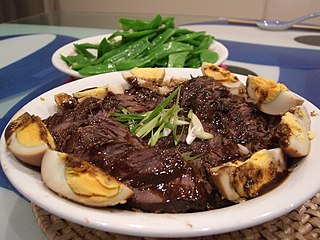
Braising is a combination-cooking method that uses both wet and dry heats: typically, the food is first browned at a high temperature, then simmered in a covered pot in cooking liquid. It is similar to stewing, but braising is done with less liquid and usually used for larger cuts of meat. Braising of meat is often referred to as pot roasting, though some authors make a distinction between the two methods, based on whether additional liquid is added. Osso buco and coq au vin are well known braised meat dishes, and the technique can also be used to prepare fish, tempeh, tofu, or fruits and vegetables.

Sukiyaki is a Japanese dish that is prepared and served in the nabemono style.
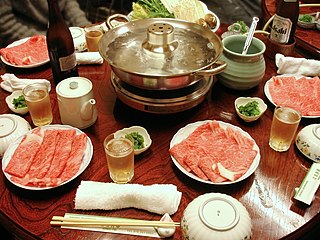
Shabu-shabu is a Japanese nabemono hotpot dish of thinly sliced meat and vegetables boiled in water and served with dipping sauces. The term is onomatopoeic, derived from the sound – "swish swish" – emitted when the ingredients are stirred in the cooking pot. The food is cooked piece by piece by the diner at the table. Shabu-shabu is generally more savory and less sweet than sukiyaki, another hot pot dish.
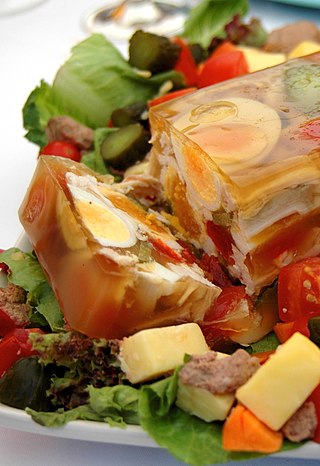
Aspic or meat jelly is a savory gelatin made with a meat stock or broth, set in a mold to encase other ingredients. These often include pieces of meat, seafood, vegetable, or eggs. Aspic is also sometimes referred to as aspic gelée or aspic jelly. In its simplest form, aspic is essentially a gelatinous version of conventional soup.

A cabbage roll is a dish consisting of cooked cabbage leaves wrapped around a variety of fillings. It is common to the cuisines of Central, Northern, Eastern and Southeastern Europe and much of Western Asia, Northern China, as well as parts of North Africa. Meat fillings are traditional in Europe, and include beef, lamb, or pork seasoned with garlic, onion, and spices. Grains such as rice and barley, mushrooms, and vegetables are often included as well. Fermented cabbage leaves are used for wrapping, particularly in southeastern Europe. In Asia, seafoods, tofu, and shiitake mushrooms may also be used. Chinese cabbage is often used as a wrapping.

Butajiru or tonjiru is a Japanese soup made with pork and vegetables, flavoured with miso. It is a more substantial version of miso soup, with a larger quantity and variety of ingredients.

Kimchi-jjigae (Korean: 김치찌개) or kimchi stew is a jjigae, or stew-like Korean dish, made with kimchi and other ingredients, such as pork, scallions, onions, and diced tofu. It is one of the most common stews in Korean cuisine.
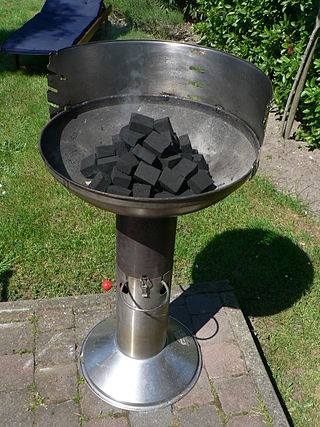
Barbecue varies by the type of meat, sauce, rub, or other flavorings used, the point in barbecuing at which they are added, the role smoke plays, the equipment and fuel used, cooking temperature, and cooking time.

Pulled pork is an American barbecue dish, more specifically a dish of the Southern U.S., based on shredded barbecued pork shoulder. It is typically slow-smoked over wood ; indoor variations use a slow cooker. The meat is then shredded manually and mixed with a sauce. It may be served on bread as a sandwich, or eaten on its own.

Picadillo is a traditional dish in many Latin American countries including Mexico and Cuba, as well as the Philippines. It is made with ground meat, tomatoes, and also raisins, olives, and other ingredients that vary by region. The name comes from the Spanish word picar, meaning "to mince".
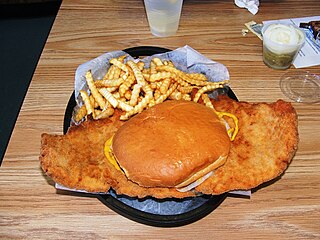
The pork tenderloin sandwich, also known as a breaded pork tenderloin sandwich (BPT), contains a breaded and fried cutlet similar to Wiener Schnitzel and is popular in the Midwest region of the United States, especially in the states of Indiana, Illinois, Nebraska, Missouri and Iowa. The sandwich is claimed to have originated at Nick's Kitchen restaurant in Huntington, Indiana, near Fort Wayne.

Bánh cuốn is a Vietnamese dish originating from Northern Vietnam.

Sundubu-jjigae (Korean: 순두부찌개) is a jjigae in Korean cuisine. The dish is made with freshly curdled extra soft tofu (sundubu) which has not been strained and pressed, vegetables, sometimes mushrooms, onion, optional seafood, optional meat, and gochujang or gochugaru. The dish is assembled and cooked directly in the serving vessel, which is traditionally made of thick, robust porcelain, but can also be ground out of solid stone. A raw egg can be put in the jjigae just before serving, and the dish is delivered while bubbling vigorously. It is typically eaten with a bowl of cooked white rice and several banchan.
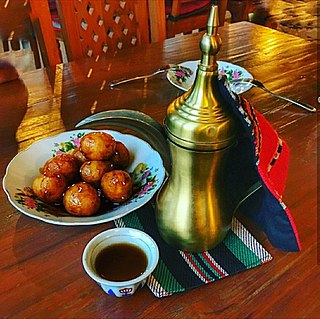
Emirati cuisine is the local traditional Arabic cuisine of the United Arab Emirates. It is part of Eastern Arabian cuisine and shares similarities with cuisines from neighboring countries, such as Omani cuisine and Saudi Arabian cuisine, as well as influences from different Middle Eastern and Asian cuisines.

Beninese cuisine involves many fresh meals served with a variety of sauces. Meat is usually quite expensive, and meals are generally light on meat and generous on vegetable fat.

Black pudding is a distinct national type of blood sausage originating in the United Kingdom and Ireland. It is made from pork or occasionally beef blood, with pork fat or beef suet, and a cereal, usually oatmeal, oat groats, or barley groats. The high proportion of cereal, along with the use of certain herbs such as pennyroyal, serves to distinguish black pudding from blood sausages eaten in other parts of the world.

Steam minced pork refers to a savory dish popular in Hong Kong and the Guangdong area of China. Consisting mainly of minced pork, it typically includes ingredients such as dried squid (土魷) and preserved cabbage (梅菜). The dish is cooked by steaming over a pot of boiling water until it is well cooked. The seasonings usually include soy sauce, salt, sugar and corn flour and occasionally white pepper and sesame oil. It is usually served with rice during lunch or dinner.
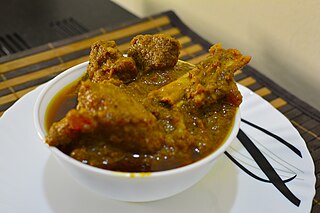
Mutton curry is a dish that is prepared from goat meat and vegetables. The dish is found in different variations across all states, countries and regions of the Indian subcontinent and the Caribbean.

Hot pot or hotpot, also known as steamboat, is a dish whereby a heat source placed on the dining table keeps a pot of soup stock simmering, and accompanied with an array of Chinese foodstuffs and ingredients and food offerings provided for the diners to dip into the flavorful broth.
References
- ↑ "Diccionari català-valencià-balear". dcvb.iec.cat. Retrieved 2022-05-30.
- ↑ Eliana Thibaut-Comelade.
- ↑ "recepta ollada". herve.pi.free.fr. Retrieved 2022-05-30.